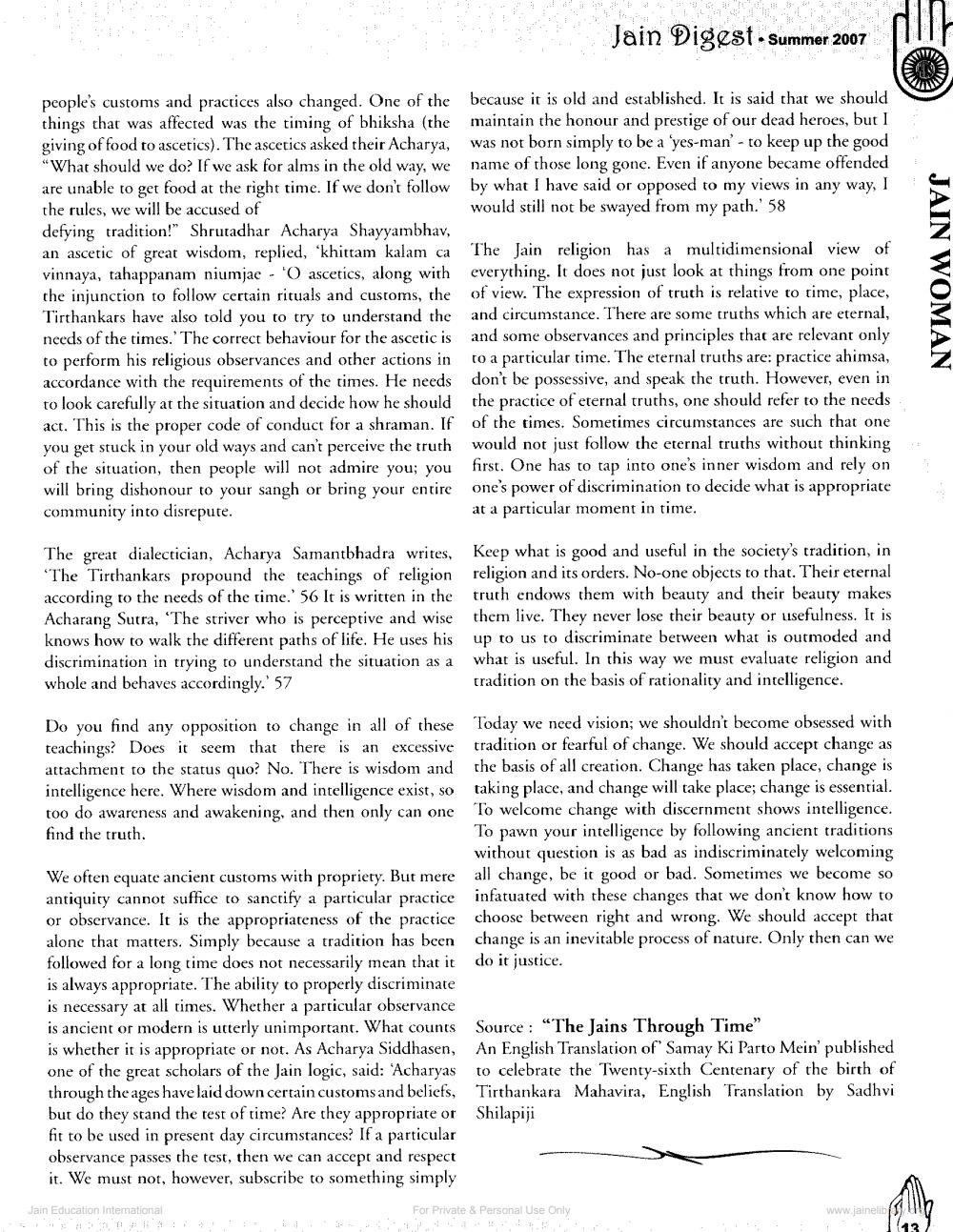________________
Jain Digest - Summer 2007
people's customs and practices also changed. One of the because it is old and established. It is said that we should things that was affected was the timing of bhiksha (the maintain the honour and prestige of our dead heroes, but I giving of food to ascetics). The ascetics asked their Acharya, was not born simply to be a yes-man' - to keep up the good "What should we do? If we ask for alms in the old way, we name of those long gone. Even if anyone became offended are unable to get food at the right time. If we don't follow by what I have said or opposed to my views in any way, I the rules, we will be accused of
would still not be swayed from my path.' 58 defying tradition!" Shrutadhar Acharya Shayyambhav, an ascetic of great wisdom, replied, 'khittam kalam ca The Jain religion has a multidimensional view of vinnaya, tahappanam niumjae - 'O ascetics, along with everything. It does not just look at things from one point the injunction to follow certain rituals and customs, the of view. The expression of truth is relative to time, place, Tirthankars have also told you to try to understand the and circumstance. There are some truths which are eternal, needs of the times.' The correct behaviour for the ascetic is and some observances and principles that are relevant only to perform his religious observances and other actions in to a particular time. The eternal truths are: practice ahimsa, accordance with the requirements of the times. He needs don't be possessive, and speak the truth. However, even in to look carefully at the situation and decide how he should the practice of eternal truths, one should refer to the needs act. This is the proper code of conduct for a shraman. If of the times. Sometimes circumstances are such that one you get stuck in your old ways and can't perceive the truth would not just follow the eternal truths without thinking of the situation, then people will not admire you; you first. One has to tap into one's inner wisdom and rely on will bring dishonour to your sangh or bring your entire one's power of discrimination to decide what is appropriate community into disrepute.
at a particular moment in time.
JAIN WOMAN
The great dialectician, Acharya Samantbhadra writes. Keep what is good and useful in the society's tradition, in "The Tirthankars propound the teachings of religion religion and its orders. No-one objects to that. Their eternal according to the needs of the time.' 56 It is written in the truth endows them with beauty and their beauty makes Acharang Sutra, "The striver who is perceptive and wise them live. They never lose their beauty or usefulness. It is knows how to walk the different paths of life. He uses his up to us to discriminate between what is outmoded and discrimination in trying to understand the situation as a what is useful. In this way we must evaluate religion and whole and behaves accordingly. 57
tradition on the basis of rationality and intelligence.
Do you find any opposition to change in all of these Today we need vision; we shouldn't become obsessed with teachings? Does it seem that there is an excessive tradition or fearful of change. We should accept change as attachment to the status quo? No. There is wisdom and the basis of all creation. Change has taken place, change is intelligence here. Where wisdom and intelligence exist, so taking place, and change will take place; change is essential. too do awareness and awakening, and then only can one To welcome change with discernment shows intelligence. find the truth.
To pawn your intelligence by following ancient traditions
without question is as bad as indiscriminately welcoming We often equate ancient customs with propriety. But mere all change, be it good or bad. Sometimes we become so antiquity cannot suffice to sanctify a particular practice infatuated with these changes that we don't know how to or obscrvance. It is the appropriateness of the practice choose between right and wrong. We should accept that alone that matters. Simply because a tradition has been change is an inevitable process of nature. Only then can we followed for a long time does not necessarily mean that it do it justice. is always appropriate. The ability to properly discriminate is necessary at all times. Whether a particular observance is ancient or modern is utterly unimportant. What counts Source : “The Jains Through Time" is whether it is appropriate or not. As Acharya Siddhasen, An English Translation of Samay Ki Parto Mein' published one of the great scholars of the Jain logic, said: 'Acharyas to celebrate the Twenty-sixth Centenary of the birth of through the ages have laid down certain customs and beliefs, Tirthankara Mahavira, English Translation by Sadhvi but do they stand the test of time? Are they appropriate or Shilapiji fit to be used in present day circumstances? If a particular observance passes the test, then we can accept and respect it. We must not, however, subscribe to something simply
Jain Education Intemational
For Private & Personal Use Only
www.jainelio




